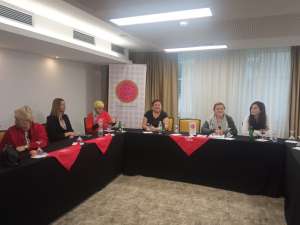SARAJEVO, November 16 (FENA) - “Does the system recognize domestic violence against LGBTI persons?”, was the topic of the conference held today to discuss the protection of victims of domestic violence, the legal framework, the systemic response to domestic violence, and domestic practices and problems in BiH, as well as the positive practice of countries in the region.
President of the Board of Directors of the Association ‘Duga’ from Serbia, Aleksandar Prica, said that LGBTI persons are exposed to constant discrimination in all areas of life, freedom of assembly, healthcare, education, the right to respect for private and family life, and sports.
“The particular problem is in violence, both physical and psychological, that this population faces within their families. The aim of this conference is to analyze the state of protection of LGBTI persons against domestic violence, which is actually the most frequent form of violence they are exposed to,” stressed Prca.
He added that in the international and domestic institutional framework in the field of protection against domestic violence, there is a lack of adequate mechanisms for protection of LGBTI children from violence most commonly committed by parents or brothers and sisters.
“Since we live in a society that hardly ever accepts diversity and deviation from traditional hetero and cis norms, attacks directed at this population are extremely common, and often perpetrators are members of the immediate family. This type of violence often has devastating consequences for mental health and the overall well-being of the victim,” Prca pointed out.
As another important problem, he singled out partner's health insurance and pointed out that even though he has lived in a same sex partnership for years with his partner who is unemployed, he cannot provide him healthcare coverage through his own employment, unlike heterosexual persons who have no problem exercising this right.
Vladana Vasić, from the Sarajevo Open Center, pointed out that young LGBTI persons suffer the same stress and anxiety that all young people go through as a part of growing up.
“What is importance is the difference in the fact that at the same time, LGBTI persons have to accept and deal with the identity that will mean they will be stigmatized and usually without the help of parents who often become their loudest ‘enemies’ Vasić said.
Vasić also pointed out that a particular problem for LGBTI persons is the lack of LGBTI inclusive safe houses in BiH.
“Certain civil society organizations run safe houses for women victims of violence and are ready to receive lesbians in them. However, there is no secured accommodation for gay men and transgender persons who are victims of domestic violence,” said Vasić.
It is necessary for the state to work on systemic solving of the problem and ensuring safe accommodation for members of vulnerable social groups - the victim of violence.
The conclusions from the conference show that despite numerous efforts, there is a long and demanding process of educating and sensitizing the entire society and social institutions that care for the welfare of all citizens on the issues of the rights and the position of LGBTI persons in BiH.
(FENA) S. R.










